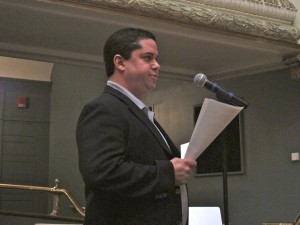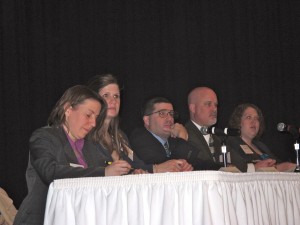Pa. DEP seeks input on overhaul of drilling regulations
-
Katie Colaneri

Katie Colaneri/StateImpact Pennsylvania
John Augustine of the Marcellus Shale Coalition, a gas industry trade group, testifies at at hearing in Williamsport.
Five years into Pennsylvania’s shale gas boom, the state is overhauling environmental regulations for drillers and changing the way the industry operates above ground.
A public hearing Monday night in Williamsport, Lycoming County set drillers, who argued the rules would go too far, against environmentalists who say the Department of Environmental Protection did not go far enough.
“I understand they’re walking a fine line. It’s a hard job for an agency,” said Nadia Steinzor, a New York-based organizer with the environmental group Earthworks. “You can’t satisfy everybody, but they know enough now.”
The rules proposed by the state Department of Environmental Protection would set new standards for running temporary pipelines, dealing with spills and storing wastes. Many of the new requirements were set by the state’s drilling law, Act 13 and will update Chapter 78 of the state code. You can read our guide to the proposed regulations here.
Steinzor told state regulators she’s disappointed they did not ban drillers from burying solid waste, which is not considered hazardous under federal or state laws.
“They certainly shouldn’t be left behind in the ground or in open pits in people’s backyards,” Steinzor said. “It’s just unacceptable and it’s not regulation.”

Katie Colaneri/StateImpact Pennsylvania
Members of the Environmental Quality Board hear public comments on new rules for oil and gas development in Williamsport.
Drillers would also be required to search for abandoned wells within 1,000 feet of the path of the well bore. The DEP says it would help build a database of the hundreds of thousands of old wells that have not been plugged and can become pathways for pollution.
Companies would be responsible for plugging old wells if they are impacted during fracking.
John Augustine with the Marcellus Shale Coalition, an industry trade group, says the industry is willing to comply with that provision, but should not be held responsible for cleaning up after old wells that were not impacted by their activities.
“That’s a standard that other industries aren’t being held to and it’s quite frankly unfair to hold oil and gas to that standard,” said Augustine, who also criticized Pennsylvania’s “complex regulatory environment” for putting the economic benefits of drilling at risk.
Act 13 also required the DEP to consider impacts to public resources like parks and historic sites. However, that section of the law, which also dealt with the DEP’s ability to waive setbacks for streams and wetlands, was recently struck down by the state Supreme Court.
Now DEP’s Deputy Secretary for Oil and Gas Management says the agency no longer has the authority to add protective conditions for those sensitive areas.
“The public resource provisions that were new to Act 13 get into things like recreation and aesthetics that we just don’t traditionally regulate and I think it’s going to be a benefit to Pennsylvanians when we are able to finalize the rule, provided of course that the Supreme Court actually reverses its decision where it actually struck down those provisions as unconstitutional,” Perry said after the hearing.
“I think they made a mistake.”
This story has been updated to clarify that the Marcellus Shale Coalition supports the DEP’s proposal to require oil and gas operators to plug abandoned wells that are impacted by fracking, but does not believe they should be liable for wells that are not affected by their activities.
















